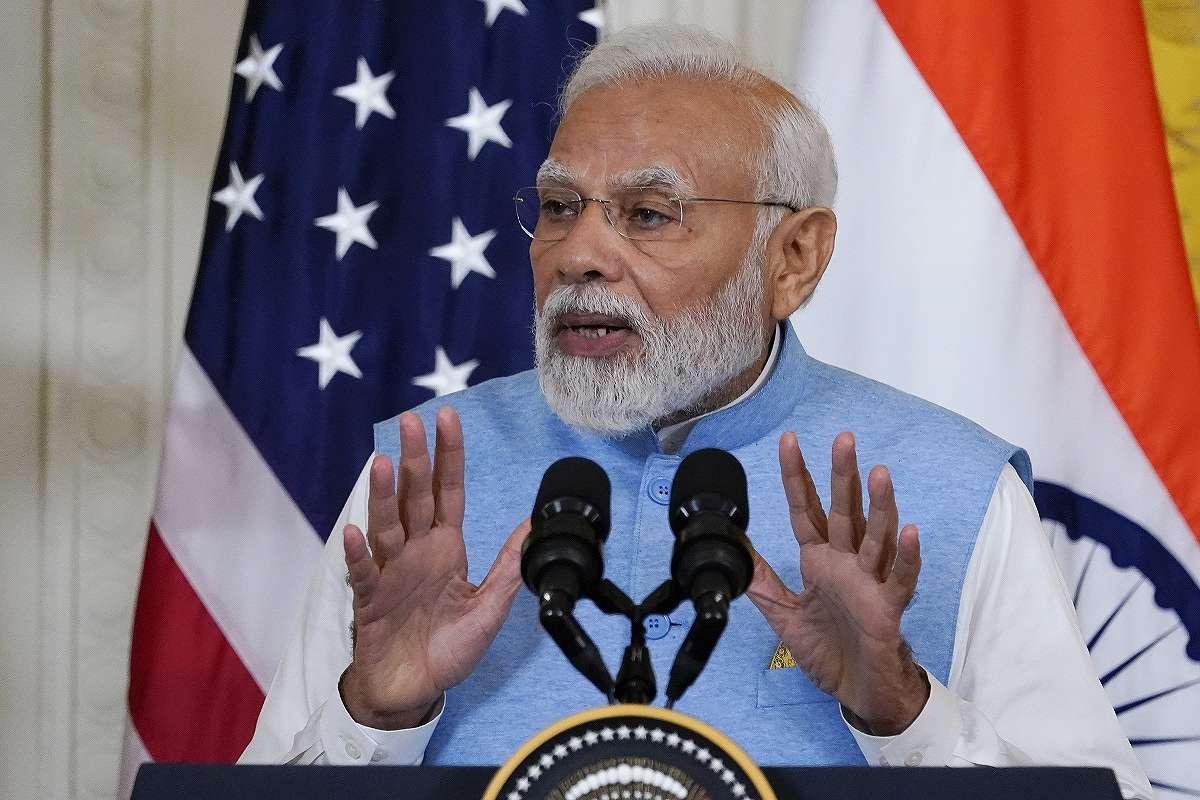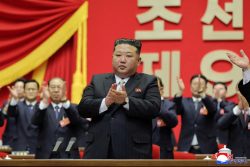
India’s Prime Minister Narendra Modi speaks during a news conference with President Joe Biden in the East Room of the White House in Washington, Thursday, June 22, 2023.
10:57 JST, June 23, 2023
WASHINGTON (AP) — Narendra Modi did something very unusual on Thursday at the White House — he took questions from journalists.
It’s a rare occurrence for the Indian prime minister who avoids unscripted moments and has presided over a steady decline in press freedom in his country.
The news conference was more limited than the kind that U.S. presidents usually hold with foreign leaders, but even that wasn’t easy to arrange with Modi. Indian officials agreed to the event only the day before, according to a person familiar with the matter who requested anonymity to discuss the sensitive negotiations.
Administration officials told Modi’s advisers that taking questions from the media was a standard part of how White House state visits are conducted, the person said.
An Indian reporter asked about addressing climate change, and an American reporter pressed Modi on human rights concerns— a particularly delicate topic as the United States seeks closer ties with India as a bulwark against China’s influence in the region.
Modi defended India by saying “democracy runs in our veins” and insisting that there is ”absolutely no space for discrimination.”
Although Modi, who is 72, has granted sporadic interviews since becoming India’s leader nine years ago, he has never held a solo press conference. Sometimes when asked questions he’ll defer to others on stage with him.
Modi also tends to keep reporters at a distance during overseas trips, such as last year in Germany, when the two countries announced a clean energy deal.
The Indian delegation had insisted then that no press conference be held, according to a German official, who spoke only on condition of anonymity.
However, Modi has loosened up a little in the company of American counterparts.
Eight years ago, when President Barack Obama visited India, Modi answered questions from two reporters, including one from The Associated Press.
Modi is active on social media where hundreds of millions follow him, hosts a monthly radio program where he directly connects with listeners, and often makes big speeches. He uses these platforms to highlight government programs, inaugurate infrastructure projects and express condolences when an accident or tragedy strikes.
But Modi has often remained silent on polarizing incidents, including when religious minorities have faced attacks by Hindu nationalists. He has also not commented on current ethnic violence roiling India’s remote northeast, where at least 100 people have died since May.
“His silences are legendary – he has never asked people to refrain from sectarian violence,” said Nilanjan Mukhopadhyay, author of a Modi biography.
He suggested that Modi should not get much credit for any press conference in Washington if only a few questions were allowed.
Modi’s action, Mukhopadhyay said, “allows him to project an image as a more reasonable and democratic leader abroad, while he continues to evade press conferences at home, where he has scant regard for press freedom.”
The decline in press freedom didn’t start with Modi and his Hindu nationalist Bharatiya Janata Party, but it’s increased. The country fell eleven places, to 160 out of 180 countries, in this year’s Press Freedom Index published by Reporters Without Borders.
The organization cited violence against journalists and a partisan media landscape as reasons that “press freedom is in crisis in the world’s largest democracy.”
“With an average of three or four journalists killed in connection with their work every year, India is one of the world’s most dangerous countries for media,” the report said.
India’s foreign minister, Subrahmanyam Jaishankar, dismissed the report’s claims at an event last month.
In recent years, journalists have been arrested and some are stopped from traveling abroad. Dozens are facing criminal prosecution, including for sedition. At the same time, the government has introduced sweeping regulatory laws for social media companies that give it more power to police online content.
A number of media outlets critical of Modi have also been subjected to tax searches, most recently the BBC after it aired a documentary that examined the prime minister’s role in 2002 anti-Muslim riots in the western state of Gujarat, where he was chief minister at the time.
More than 1,000 people were killed in the violence. Modi has denied allegations that authorities under his watch allowed and even encouraged the bloodshed, and India’s Supreme Court said it found no evidence to prosecute him.
The two-part BBC program drew an immediate backlash from the Indian government, which invoked emergency powers under its information technology laws to block it from being shown in the country. Social media platforms including Twitter and YouTube also complied with government requests to remove links to the documentary.
Top Articles in News Services
-

Survey Shows False Election Info Perceived as True
-

Prudential Life Expected to Face Inspection over Fraud
-

Hong Kong Ex-Publisher Jimmy Lai’s Sentence Raises International Outcry as China Defends It
-

Japan’s Nikkei Stock Average Touches 58,000 as Yen, Jgbs Rally on Election Fallout (UPDATE 1)
-

Japan’s Nikkei Stock Average Falls as US-Iran Tensions Unsettle Investors (UPDATE 1)
JN ACCESS RANKING
-

Japan PM Takaichi’s Cabinet Resigns en Masse
-

Japan Institute to Use Domestic Commercial Optical Lattice Clock to Set Japan Standard Time
-

Israeli Ambassador to Japan Speaks about Japan’s Role in the Reconstruction of Gaza
-

Man Infected with Measles Reportedly Dined at Restaurant in Tokyo Station
-

Videos Plagiarized, Reposted with False Subtitles Claiming ‘Ryukyu Belongs to China’; Anti-China False Information Also Posted in Japan























